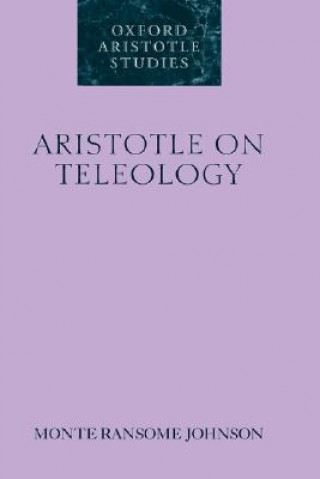
Code: 04531699
Aristotle on Teleology
by Monte Ransome Johnson
Monte Johnson examines one of the most controversial aspects of Aristiotle's natural philosophy: his teleology. Is teleology about causation or explanation? Does it exclude or obviate mechanism, determinism, or materialism? Is it ... more
- Language:
 English
English - Binding: Hardback
- Number of pages: 352
Publisher: Oxford University Press, 2005
- More about this

You might also like
-

Encyclopedia of Literary and Cultural Theory
615.23 € -

Case-based Geriatrics: A Global Approach
126.11 € -

Ag Bun Na Cruaiche
24.44 € -10 %
Give this book as a present today
- Order book and choose Gift Order.
- We will send you book gift voucher at once. You can give it out to anyone.
- Book will be send to donee, nothing more to care about.
More about Aristotle on Teleology
You get 554 loyalty points
 Book synopsis
Book synopsis
Monte Johnson examines one of the most controversial aspects of Aristiotle's natural philosophy: his teleology. Is teleology about causation or explanation? Does it exclude or obviate mechanism, determinism, or materialism? Is it focused on the good of individual organisms, or is god or man the ultimate end of all processes and entities? Is teleology restricted to living things, or does it apply to the cosmos as a whole? Does it identify objectively existent causes in the world, or is it merely a heuristic for our understanding of other causal processes? Johnson argues that Aristotle's aporetic approach drives a middle course between these traditional oppositions, and avoids the dilemma, frequently urged against teleology, between backwards causation and anthropomorphism. Although these issues have been debated with extraordinary depth by Aristotle scholars, and touched upon by many in the wider philosophical and scientific community as well, there has been no comprehensive historical treatment of the issue. Aristotle is commonly considered the inventor of teleology, although the precise term originated in the eighteenth century. But if teleology means the use of ends and goals in natural science, then Aristotle was rather a critical innovator of teleological explanation. Teleological notions were widespread among his predecessors, but Aristotle rejected their conception of extrinsic causes such as mind or god as the primary causes for natural things. Aristotle's radical alternative was to assert nature itself as an internal principle of change and an end, and his teleological explanations focus on the intrinsic ends of natural substances - those ends that benefit the natural thing itself. Aristotle's use of ends was subsequently conflated with incompatible 'teleological' notions, including proofs for the existence of a providential or designer god, vitalism and animism, opposition to mechanism and non-teleological causation, and anthropocentrism. Johnson addresses these misconceptions through an elaboration of Aristotle's methodological statements, as well as an examination of the explanations actually offered in the scientific works.
 Book details
Book details
Book category Books in English Humanities Philosophy History of Western philosophy
223.99 €
- Full title: Aristotle on Teleology
- Author: Monte Ransome Johnson
- Language:
 English
English - Binding: Hardback
- Number of pages: 352
- EAN: 9780199285303
- ISBN: 0199285306
- ID: 04531699
- Publisher: Oxford University Press
- Weight: 686 g
- Dimensions: 242 × 164 × 26 mm
- Date of publishing: 03. November 2005
Trending among others
-

Meditations
8.89 € -29 % -

The Myth of Sisyphus
8.07 € -

Aphorisms on Love and Hate
3.57 € -24 % -

Myth of Sisyphus
11.14 € -23 % -

Discourses and Selected Writings
10.93 € -24 % -

Simulacra and Simulation
19.01 € -17 % -

At The Existentialist Cafe
12.78 € -1 % -
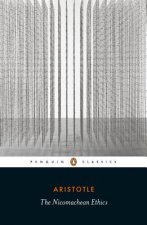
Nicomachean Ethics
11.96 € -17 % -
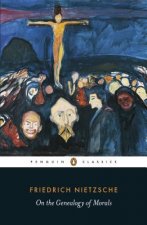
On the Genealogy of Morals
11.14 € -17 % -
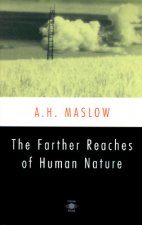
The Farther Reaches of Human Nature
16.36 € -10 % -
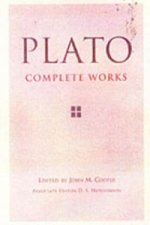
Plato: Complete Works
76.91 € -15 % -
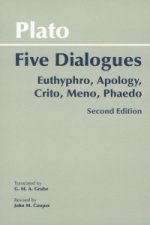
Plato: Five Dialogues
13.59 € -14 % -
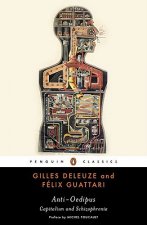
Anti-Oedipus
19.32 € -20 % -
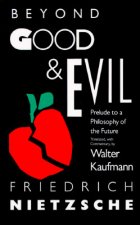
Beyond Good & Evil
12.88 € -21 % -

Thus Spoke Zarathustra
25.66 € -11 % -
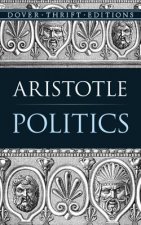
Politics
10.83 € -19 % -

Selected Philosophical Writings
11.55 € -29 % -
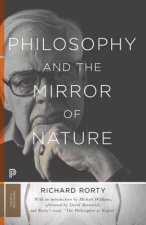
Philosophy and the Mirror of Nature
19.63 € -19 % -
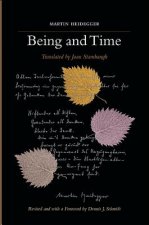
Being and Time
20.65 € -21 % -
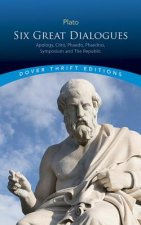
Six Great Dialogues
6.84 € -19 % -
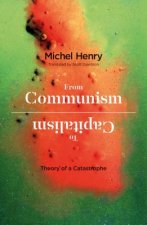
From Communism to Capitalism
70.77 € -

Meditations
20.04 € -21 % -

Why I Am so Clever
3.88 € -18 % -

Letters from a Stoic
12.37 € -15 % -
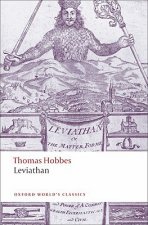
Leviathan
9.50 € -16 % -

Meditations
14.92 € -25 % -

Beyond Good and Evil
9.71 € -33 % -

Existentialism Is a Humanism
8.07 € -28 % -

Either/Or
19.42 € -

The Symposium
9.30 € -25 % -

Think
12.26 € -23 % -
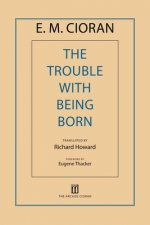
The Trouble With Being Born
11.85 € -27 % -

Ride the Tiger
19.22 € -26 % -

Spell of the Sensuous
17.07 € -12 % -

Nausea
11.14 € -23 % -

Gay Science
12.67 € -22 % -

Nicomachean Ethics
5.62 € -25 % -

Thus Spoke Zarathustra
9.50 € -29 % -

Twilight of the Idols with The Antichrist and Ecce Homo
5.41 € -28 % -

Socrates' Defence
3.47 € -26 % -

Ecce Homo
11.34 € -31 % -

Human, All Too Human & Beyond Good and Evil
5.92 € -21 % -
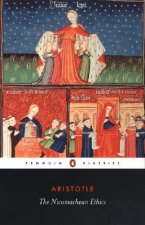
Nicomachean Ethics
12.98 € -18 % -

Works of Love
11.45 € -28 % -

On War
5.51 € -26 % -
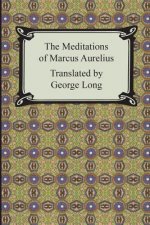
Meditations of Marcus Aurelius
8.17 € -13 % -
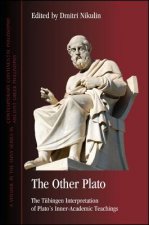
Other Plato
40.80 € -

Republic
11.96 € -17 % -

Phenomenology of Spirit
34.87 €
Collection points Bratislava a 2642 dalších
Copyright ©2008-24 najlacnejsie-knihy.sk All rights reservedPrivacyCookies



 15549 collection points
15549 collection points Delivery 2.99 €
Delivery 2.99 € 02/210 210 99 (8-15.30h)
02/210 210 99 (8-15.30h)